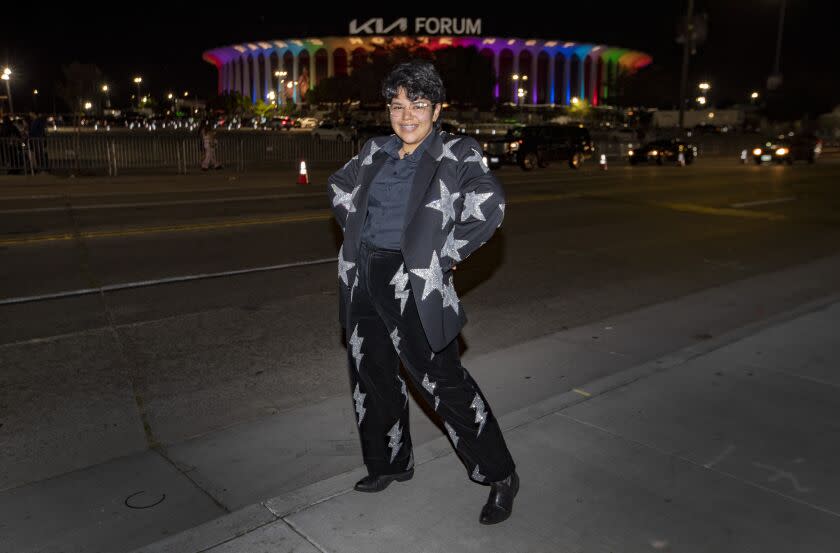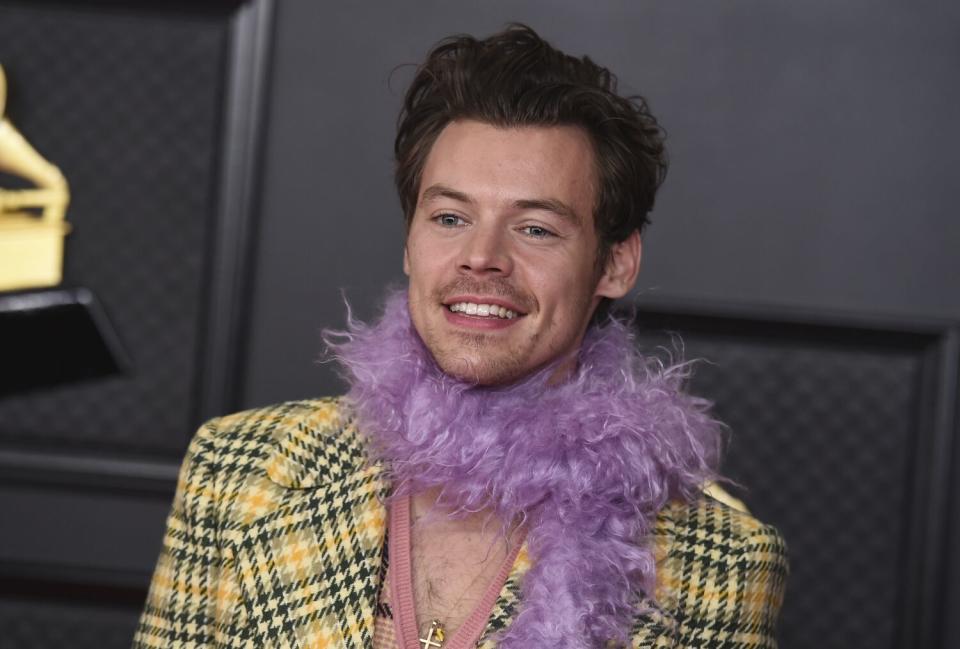At Harry Styles concerts, young gender-nonconforming fans celebrate the freedom to be themselves

- Oops!Something went wrong.Please try again later.
Katelyn could hardly believe it.
Harry Styles’ percussionist, Pauli Lovejoy, picked up the nonbinary pride flag their friend had tossed onstage and began dancing and waving it while Styles sang. It was October of last year, and Styles was performing in Nashville. Katelyn, a nonbinary fan who asked to go by their first name because they have not yet come out to certain family members, screamed with joy at the top of their lungs.
“It just made me feel so safe and validated and loved for being who I am,” said Katelyn, 19, who uses they/them pronouns. “I came out to a lot of people after that experience.”
It’s no secret that Styles is a champion of the LGBTQ community, but to a special section of that fan base — his young gender-nonconforming devotees — Styles’ ability to exist comfortably, and extremely publicly, in a fluid space along the gender spectrum is particularly resonant. For them, Styles, 28, is an icon and advocate whose journey to self-actualization, and unapologetic ability to wear a Gucci gown or a string of pearls, mirrors their own strides toward self-love and discovery.
At his concerts, Styles regularly helps fans come out to their families by reading signs they hold up in the audience. He then celebrates them by leading the crowd in affirming chants, as he did on opening night of his 15-show stand at Inglewood's Kia Forum. After asking a fan named Serena if she was sure she wanted to go public, he declared, "Congratulations, Serena, thank you for being here tonight."
“He helped me feel like a lot of things about myself are OK,” said Alondra “Ash” Sandoval, 20, who uses she/they pronouns and said they are just beginning to explore their gender identity. Sandoval stood in the Forum parking lot wearing a snazzy black suit emblazoned with bright silver stars. The venue behind her was bathed in rainbow colors.
Sandoval said that when they see Styles making gender-expansive fashion choices, they aspire to do that too, while taking note of the fact that Styles is loved by the masses for being exactly who he is.
“They see him, they like him,” Sandoval said of Styles fans. “And if they like him, they might like me too.”
In a world overheated by culture wars pocked with ugly barbs directed at young people like Katelyn and Sandoval — the “Don’t Say Gay” law in Florida, the anti-trans legislation in Texas, the unrelenting flood of snark directed toward gender-nonconforming teens on Twitter — Styles' mantra of “Please feel free to be whoever it is you want to be in this room tonight” is a loving call to arms.
Styles has dropped so many references to his feelings about sexuality and his thoughts on gender nonconformity that fans regularly track them online. In an April 2022 Better Homes & Gardens cover story, the pop star called it "outdated" that people should expect him to declare his sexuality publicly.
"I've been really open with it with my friends, but that's my personal experience; it's mine," he told the magazine. "The whole point of where we should be heading, which is toward accepting everybody and being more open, is that it doesn't matter, and it's about not having to label everything, not having to clarify what boxes you're checking."
A few months later in a Rolling Stone cover story, Styles said, "I think everyone, including myself, has your own journey with figuring out sexuality and getting more comfortable with it."

Styles' superstardom has solidified at a moment when pop music and its fans are increasingly accepting of queer identities and gender nonconformity. In 2019, Taylor Swift, who had rarely taken a political stance, earned plaudits — if also a bit of criticism regarding the depth of her allyship — for her pro-LGBTQ anthem "You Need to Calm Down." Pop star Halsey updated her pronouns to "she/they" in 2021, and Demi Lovato announced in 2022 that she identified as queer and pansexual. Meanwhile, Grammy-nominated rapper Lil Nas X built on the success of his smash hit "Old Town Road" by presenting some of the most overtly queer visuals in popular music history. And just this month, Sam Smith and Kim Petras became the first nonbinary person and the first transgender person, respectively, to top Billboard's Hot 100 with their duet "Unholy."
Louie Dean Valencia, an associate professor of digital history at Texas State University, believes so much that Styles is a touchstone of early 21st century culture that he is teaching a new course, beginning spring semester 2023, called “Harry Styles and the Cult of Celebrity: Identity, the Internet and European Pop Culture.”
The course, which filled up in a hot second and gained international media attention, teases out important sociopolitical moments of recent history through Styles’ progression from boy-band heartthrob in One Direction, beginning in 2010, to the current moment, when the aforementioned Gucci gown — worn by Styles as the first man ever to be featured solo on the cover of Vogue — is featured in an exhibition at London’s Victoria and Albert Museum called “Fashioning Masculinities: the Art of Menswear.”
By examining how society’s dialogue around issues of gender, sexuality and race have changed in the past 12 years through the prism of Styles’ own art and activism, Valencia said, it becomes clear that through Styles, “a lot of a lot of people have learned empathy, they've learned how to love others — to treat people with kindness, as Harry would say — but also to love themselves.”
Such messages are particularly powerful for gender-nonconforming individuals, said Valencia, adding that Styles is building on the gender-fluid legacies of performers like Little Richard, David Bowie and Prince with an intentionality unique to the social media-savvy landscape of our current era.
Styles' firm refusal to label his own sexuality is part of that intentionality, said Valencia, pointing out that “queerness as a concept was originally meant to be this rejection of labels — you didn't have to call yourself bisexual, or gay or lesbian — it was meant to be a unifying concept for people who are not heteronormative.”
Not all observers agree that it's fine for Styles to disregard gender norms and ally himself so firmly with the LGBTQ community without identifying himself as part of it. He has been accused by some critics and disgruntled fans of “queerbaiting” — or co-opting queer identity — an ongoing controversy that is peaking as his latest film, “My Policeman” comes out, in which he plays a closeted gay man in 1950s England.
Many gender-nonconforming fans have served as Styles’ most staunch defenders. Grace Daniels, 19, who attends New York University and uses they/them pronouns, said that Styles does not need to state anything publicly.
“Gender exists on a spectrum, sexuality exists on the spectrum,” Daniels said. “And who's to say that you have to even have a label at all? Which is something that he has emphasized, extensively.”
Another fan, Suba, 19, who is from the South and uses she/they pronouns (who asked to be identified by their first name since they have not yet come out to certain members of their family), recently wrote an 11-page paper on the subject for their writing seminar.
In the paper, they argue that accusing Styles of “queerbaiting” is essentially the same as “telling any young kid out there who is hesitant to do something, like dressing a certain way, that they are not allowed to try out different expressions without having to label themselves one way or another.”
In addition to identifying with Styles’ rejection of labels and his near-utopian embrace of freedom and fluidity, Styles’ young gender-nonconforming fans feel close to him because they’ve watched him grow up, sometimes tentatively exploring the gender spectrum — while doing the same thing themselves.
Styles was 16 when he shot to fame in One Direction, and many of his most ardent fans were in grade school at the time — nursing secret, deeply personal feelings that they did not fit in the neat boxes that society is so adept at drawing.
“It definitely felt like we were on a journey together,” said Renee Hernandez, 22, who uses they/them pronouns and now teaches high-school English in L.A. “I see so much of myself in him, in the way he expresses himself.”
Hernandez said the song “Lights Up,” which came out in 2019, just when they were beginning to realize they were nonbinary, changed their life.
“I feel like that was just what I needed at that point in my life,” they said of the soulful tune with the lyrics, “Lights up and they know who you are / know who you are / do you know who you are / shine / step into the light.”
San Antonio-based transgender fan, Derek D., 19, agrees. When Derek (who asked to go by his first name and last initial only, out of concerns for privacy), was about 11 years old, and Styles was still in One Direction, Derek said, he remembers a fan complimenting Styles on his black nail polish and Styles acting a bit shy and embarrassed about it.
“Times were a little bit different back then. And I remember resonating with that a lot, just that aspect of doing something outside of what is typically acceptable for your gender,” and then feeling a bit sheepish in public, Derek said. Derek now calls this “the nail polish story,” and said it’s an anecdote he uses a lot when discussing the stepping stones along the way to discovering his identity.
“It's almost as if he's walking in front of me,” said Derek of Styles. “And he’s leading a path, saying, ‘It's OK. I promise it's OK to be yourself’.”
This story originally appeared in Los Angeles Times.

